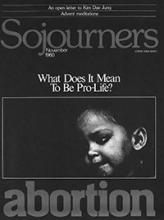"Therefore choose life." The peace movement has made that familiar scriptural appeal a basic principle of action and, in most respects, has been faithful to it. Not only have pacifists chosen life by rejecting war and its increasingly murderous weaponry, but they have carried that principle over into their opposition to capital punishment and refusal to support racial and other forms of entrenched discrimination. More recently that same commitment has given rise to an active concern about the threatened despoilation of the environment upon which our very existence and that of future generations must depend.
Only on this issue of abortion--and, to a lesser but growing extent, euthanasia--does one encounter a strange reluctance on their part to speak out in favor of choosing life. More disturbing still, this pattern of cautious avoidance is broken by unquestionably sincere opponents of war who somehow find it possible to justify and openly support the intentional destruction of human life in its earliest stages of development.
If we are honest about it and dismiss the euphemisms that are often advanced to hide the ugly truth, this is precisely what abortion involves, quite apart from whatever "beneficial" personal or social purposes may be claimed for it. We begin with the incontestable fact that life is present from conception on; indeed, if there were no life, there would be no need for "procedures" to terminate it and, it would follow, no controversy to concern us here.
Read the Full Article

